倒装 强调 省略
英语倒装句语法点
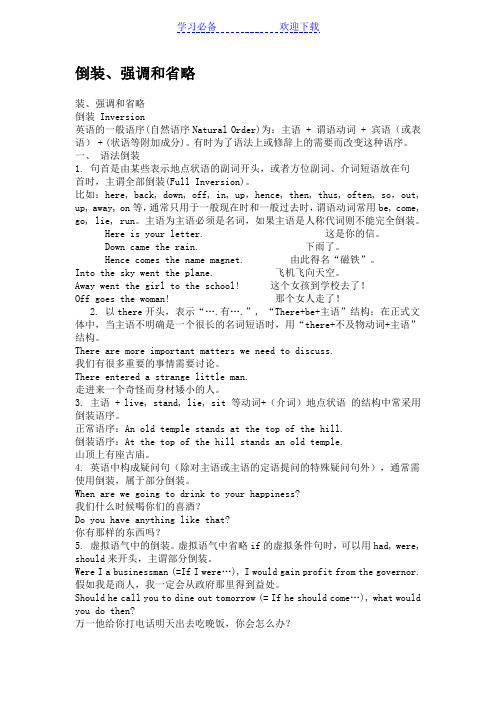
倒装、强调和省略装、强调和省略倒装 Inversion英语的一般语序(自然语序Natural Order)为:主语 + 谓语动词 + 宾语(或表语) + (状语等附加成分)。
有时为了语法上或修辞上的需要而改变这种语序。
一、语法倒装1. 句首是由某些表示地点状语的副词开头,或者方位副词、介词短语放在句首时,主谓全部倒装(Full Inversion)。
比如:here, back, down, off, in, up,hence, then, thus, often, so,out, up, away, on等,通常只用于一般现在时和一般过去时,谓语动词常用be, come, go, lie, run。
主语为主语必须是名词,如果主语是人称代词则不能完全倒装。
Here is your letter. 这是你的信。
Down came the rain. 下雨了。
Hence comes the name magnet. 由此得名“磁铁”。
Into the sky went the plane. 飞机飞向天空。
Away went the girl to the school! 这个女孩到学校去了!Off goes the woman! 那个女人走了!2. 以there开头,表示“….有….”, “There+be+主语”结构;在正式文体中,当主语不明确是一个很长的名词短语时,用“there+不及物动词+主语”结构。
There are more important matters we need to discuss.我们有很多重要的事情需要讨论。
There entered a strange little man.走进来一个奇怪而身材矮小的人。
3. 主语 + live, stand, lie, sit 等动词+(介词)地点状语的结构中常采用倒装语序。
正常语序:An old temple stands at the top of the hill.倒装语序:At the top of the hill stands an old temple.山顶上有座古庙。
英语语法复习专题 特殊句式--强调、省略和倒装
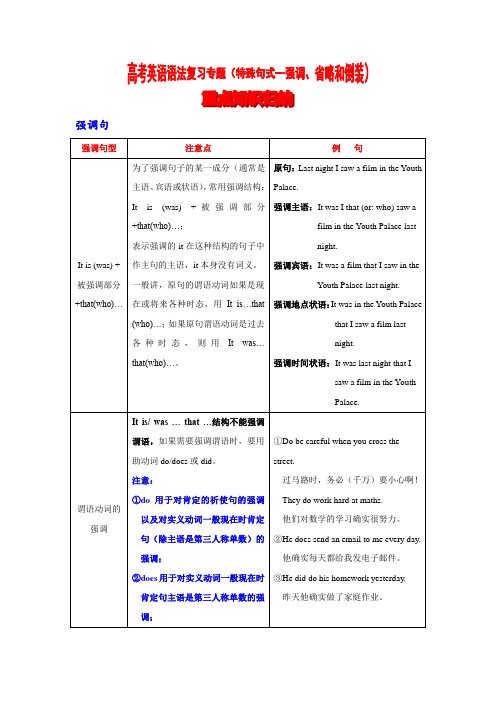
强调句③did用于对实义动词一般过去时肯定句的强调。
It is (was) +被强调部分+that(who)…句型的变式It is (was) + 被强调部分+that(who)…句式基本特征:Is/ Was it +被强调部分+that…;或情态动词+it+ be+被强调部分+ that…①Was it in 1969 ________ the American astronautssucceeded _______ landing on the moon ?A. when; onB. that; onC. when; inD.that; in②Could it be in the restaurant in ______ you haddinner with me yesterday ______ you lost yourhandbag?A. that; whichB. which; thatC. where; thatD. that; where特殊疑问句形式句式基本特征:特殊疑问词+is/was it that…?或特殊疑问词+情态动词+it+be++被强调部分+that…—_______is it _______has made Peter _______heis today?—Determination.A. What; that; thatB. That; that; whatC. What; what; thatD. What; that; what反意疑问句形式句式基本特征:It is/was+被强调部分+that…,isn’t/ wasn’t it?It was Alice and her boyfriend who sent the old manto the hospital, ______?A. do theyB. didn’t theyC. wasn’t itD.was it强调句与其它句型的结合与名词从句的结合句式特征为:整个强调句型用作名词性从句或者在强调句型中含有名词性从句。
特殊句式强调省略主谓一致倒装及其他高考英语 语法
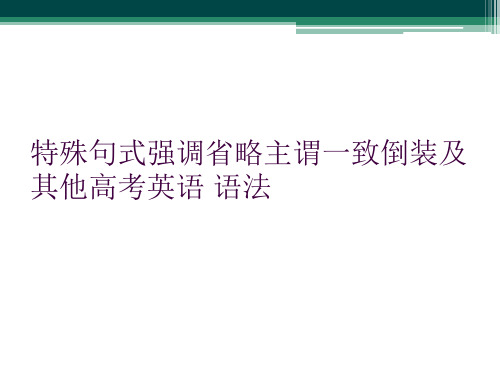
特殊句式强调省略主谓一致倒装及 其他高考英语 语法
特殊句式(强调、省略、主谓一致、 倒装及其他)
1.强调句的基本句型是“It is/was+被强调的部分+that/who+ 其他部分”。被强调的部分可以是主语、宾语和状语等。
It is only children who make such stupid mistakes. 只有孩子才会犯这样愚蠢的错误。 (2009·浙江卷)—I’ve read another book this week. ——这星期我又看了一本书。 —Well,maybe it is not how much you read but what you read that counts. ——嗯,也许重要的不是你看了多少而是你看了什么。 It was because her mother was ill that she didn’t come to school yesterday.是因为她妈妈病了,她昨天才没来上学的。
Sunday.
A.which
B.that
C.where
D.there
解析: 该题考查句式。该题实际考查的是定语从句,修饰先行词
supermarket。很多考生可能会误认为是强调句。
高考倒装省略强调等用法
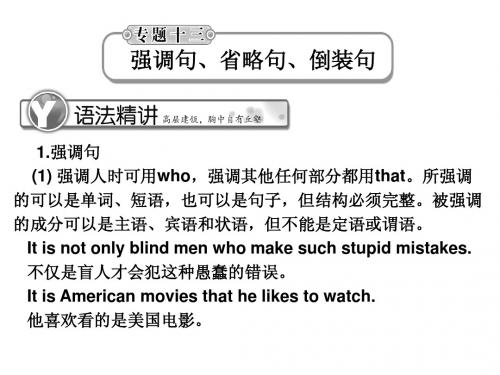
(4) 在so/such ...that引导的结果状语从句中,so或such引导的部 分置于句首时主句用倒装。 So shallow is the lake that no fish can live in it. 湖水那么浅,以致于没有鱼能在里面生存。 Such a good boy is he that we all love him. 他是那么好的一个孩子,我们都喜欢他。 另外,“so/neither/nor+be/助动词/情态动词+主语”so与前面 的肯定句呼应,neither/nor与前面的否定句呼应。其中动词的形式 取决于前一句的动词。表示前者的情况也(不)适用于后者或一者 (不)具备两种情况。 After that we never saw her again,nor did we hear from her. 从那以后我们再也没见过她,也没有收到过她的信件。 I saw the film last week.So did she. 上周我看了这部电影,她也看了。 (5) 省略if的虚拟条件句以had/were/should开头引起的倒装。 Were she my friend, I would ask her for help. 如果她是我的朋友,我就会请她帮忙。
3.倒装句 (1) 表示否定意义或半否定意义的词置于句首时,常用部分倒装。 常见的词有:seldom, never, hardly, no, not, little等。 Little did he know that the police were around. 他一点儿也不知道警察就在旁边。 Never before has our country been as united as it is. 现在我们的国家空前团结。 (2) 由only,not until引导的状语置于句首时,常用部分倒装。 Only by working hard can we succeed. 只有努力工作,我们才能取得成功。 (3) no sooner ...than, hardly ...when等结构中,no sooner 和hardly置于句首时,主句用倒装形式。 No sooner had he arrived home, he began to prepare the supper.他一到家就开始准备晚饭。 Hardly had he entered the room, it began to rain. 他一进屋就开始下雨了。
核心句法(五)特殊句式——强调、倒装、省略
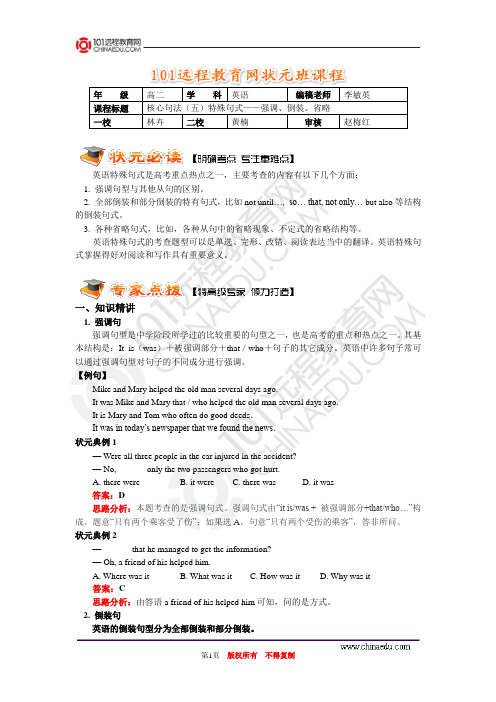
年级高二学科英语编稿老师李敏英课程标题核心句法(五)特殊句式——强调、倒装、省略一校林卉二校黄楠审核赵梅红英语特殊句式是高考重点热点之一,主要考查的内容有以下几个方面:1. 强调句型与其他从句的区别。
2. 全部倒装和部分倒装的特有句式,比如not until…, so… that, not only… but also等结构的倒装句式。
3. 各种省略句式,比如,各种从句中的省略现象、不定式的省略结构等。
英语特殊句式的考查题型可以是单选、完形、改错、阅读表达当中的翻译。
英语特殊句式掌握得好对阅读和写作具有重要意义。
一、知识精讲1. 强调句强调句型是中学阶段所学过的比较重要的句型之一,也是高考的重点和热点之一。
其基本结构是:It is(was)+被强调部分+that/who+句子的其它成分。
英语中许多句子常可以通过强调句型对句子的不同成分进行强调。
【例句】Mike and Mary helped the old man several days ago.It was Mike and Mary that / who helped the old man several days ago.It is Mary and Tom who often do good deeds.It was in today’s newspaper that we found the news.状元典例1— Were all three people in the car injured in the accident?— No, ______ only the two passengers who got hurt.A. there wereB. it wereC. there wasD. it was答案:D思路分析:本题考查的是强调句式。
强调句式由“it is/was + 被强调部分+that/who…”构成。
题意“只有两个乘客受了伤”;如果选A,句意“只有两个受伤的乘客”,答非所问。
英语倒装、强调和省略语法点
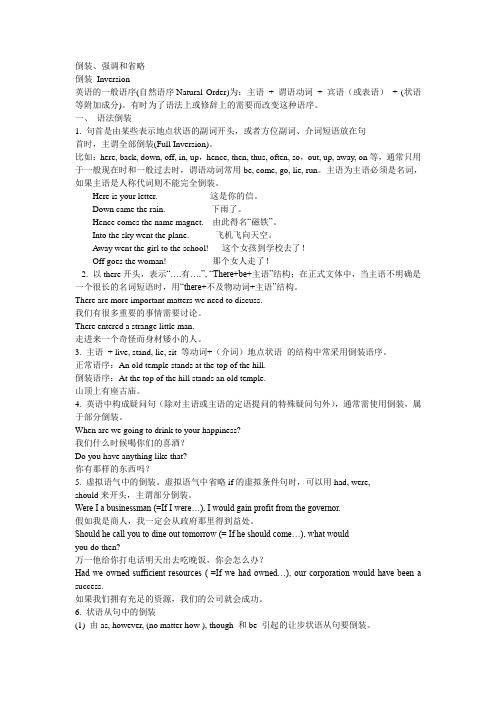
倒装、强调和省略倒装Inversion英语的一般语序(自然语序Natural Order)为:主语+ 谓语动词+ 宾语(或表语)+ (状语等附加成分)。
有时为了语法上或修辞上的需要而改变这种语序。
一、语法倒装1. 句首是由某些表示地点状语的副词开头,或者方位副词、介词短语放在句首时,主谓全部倒装(Full Inversion)。
比如:here, back, down, off, in, up,hence, then, thus, often, so,out, up, away, on等,通常只用于一般现在时和一般过去时,谓语动词常用be, come, go, lie, run。
主语为主语必须是名词,如果主语是人称代词则不能完全倒装。
Here is your letter. 这是你的信。
Down came the rain. 下雨了。
Hence comes the name magnet. 由此得名“磁铁”。
Into the sky went the plane. 飞机飞向天空。
Away went the girl to the school! 这个女孩到学校去了!Off goes the woman! 那个女人走了!2. 以there开头,表示“….有….”, “There+be+主语”结构;在正式文体中,当主语不明确是一个很长的名词短语时,用“there+不及物动词+主语”结构。
There are more important matters we need to discuss.我们有很多重要的事情需要讨论。
There entered a strange little man.走进来一个奇怪而身材矮小的人。
3. 主语+ live, stand, lie, sit 等动词+(介词)地点状语的结构中常采用倒装语序。
正常语序:An old temple stands at the top of the hill.倒装语序:At the top of the hill stands an old temple.山顶上有座古庙。
2024年新高考版英语主谓一致、虚拟语气、省略、倒装、强调讲解部分

“a number of+复数名词”作主 A number of other plants were
语时,谓语动词用复数形式,意为 found in America.在美洲还发现
“许多……”;“the number of+ 了许多其他的植物。
复数名词”作主语时,谓语动词 The number of people who travel
复合不定代词someone、anyone、everyone、nobody/no one、something、anything、everything、nothing等作主语时,谓语动词用单数
If anyone sees Lisa, ask her to call me.如果有人看 到莉萨,请她给我打个电话。 Nothing is impossible to a willing heart.世上无难 事,只怕有心人。
If he shouldn't come tomorrow, we would put off the meeting.如果他 明天不来,我们就推迟 这个会议。
使用“(should+)动词原形”的虚拟语气 1.用于宾语从句 以下动词后的宾语从句常常使用虚拟语气,即谓语为“(should+)动词原 形”。
原则
意义 一致
课标必备点梳理
常见用法
例句
当“几分之几/百分之几/half/ the rest/most+of+名词”结构作 主语时,一般根据of后的名词的 单复数决定谓语动词的单复数
20% of the people in the city object to the price of running water going up. 这个城市中百分之二十的人反 对自来水价格上调。
倒装,强调,省略

在对话中,常用so或not来替代上文的一部 分或整个从句。如: —Do you think he will lend us a hand? —I hope so. (= I hope he will lend us a hand.) 在限制性定语从句中,作宾语的关系代词 that, which, whom, who等常可以省略。如: He is the man (who / whom / that) you can depend on.
表示前面提出的某一情况也同样适用于后者 时,通常要用“so / neither / nor +系动词/助 动词/情态动词+主语”倒装结构。如: He can speak English and so can I. If she won’t go there tomorrow, neither / nor will I. 虚拟条件句含有were, should, had时,可省 略if,将were, should, had移到主语之前。如: Should you require anything, give me a ring.
that ...?
not ... until ...的强调句形式为固定结构,即:It
is / was not until ... that / who(m) ...。
2. do / does / did + 动词原形
如果需要强调谓语时,借用助动词do / does / did,且只能用于一般现在时和一般过去时的肯 定句中。如: Do be careful when you cross the street.
有时为了强调,可将谓语部分的动词-ing形 式、过去分词或不定式置于句首。如: Standing beside the table was his wife. Buried in the sands was an ancient village. To be carefully considered are the following questions.
省略、强调、倒装句
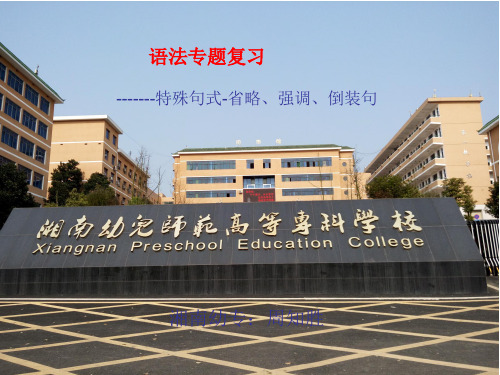
强调句巩固 1 . 强 调句 型 的基 本 形式 为 It is/was + 被 强调 部 分+ that/who+ 其他成分 被强调部分可以是主语、语和状语等。当强调部分为 “人”时,可用 that 或 who,其他情况下用 that 。 It was in Gr eece that Olympic competition star ted.奥林匹克 竞赛是在希腊开始的。 It was Columbus that discover ed Amer ica. 是哥伦布发现了美洲大陆。
Should it rain tomorrow,what should we do? 明天万一下雨,我们怎么办? 注意: 当if省略时,需用倒装语序(一般疑问句语序)。
要点4 不定式符号to 从句中不定式符号to后,常省略上文提到的不定式, 如: I went there because I want to(go there). 因为我 He didn't come to the meeting though he promised to(come). 他没来参加会议 ,尽管他许 诺说要来的。 --Do you want to come with me? 你想和我一起去 么? --I'd like/love to.
4) 由连接代词、连接副词引导的宾语从句,常在上下文 清楚的情况下省去从句。 Tom has gone,but no one knows where(he was gone). 汤姆走了,但没人知道他 到哪里去了。 Some one took my dictionary,but I don't know who(took my dictionary). 有人 拿了我的辞典,但我不知道是谁。 注意: 要保留连接词。 5) 虚拟条件从句中连词if的省略。 Were they here,they would help us. 如果他们在这里,他 Had I left earlier,I would have caught the train.
倒装句、省略句和强调句
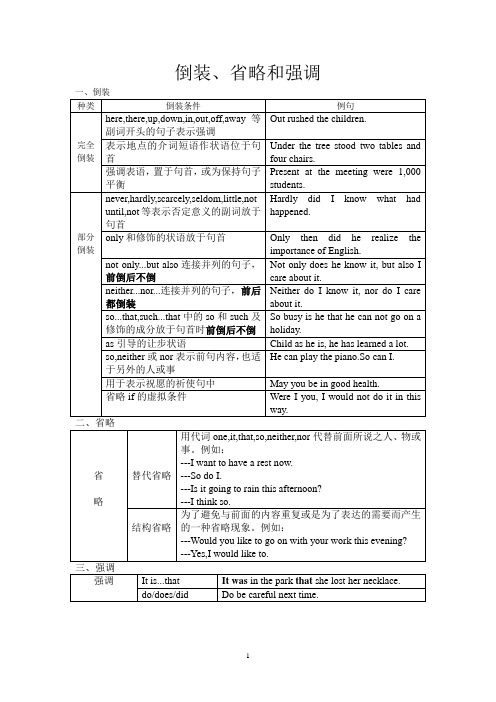
Present at the meeting were 1,000 students.
部分倒装
never,hardly,scarcely,seldom,little,not until,not等表示否定意义的副词放于句首
Hardly did I know what had happened.
1、Once upon a time there lived an old fisherman in the village.
很久很久以前,在这个村子里住着一位老渔夫。
2、There stands a mountain near the lake.
在湖边矗立着一座大山。
3、There seems to be something wrong with me.
---Would you like to go on with your work this evening?
---Yes,I would like to.
三、强调
强调
It is...that
It wasin the parkthatshe lost her necklace.
do/does/did
Do be careful next time.
四、There be句型
概念
要点
举例
There存在句表示“在某地方或时间里存在某东西或事物”
此结构中,there是引导词,be是谓语动词,be后面是名词作主语,且主谓语的数必须一致,结尾是地点状语。
1、There is a tall tree in front of the classroom.教室前面有一棵大树。
Neither do Iபைடு நூலகம்know it, nor do I care about it.
特殊句式在写作中的运用之强调句、省略句、全部倒装--2022高考英语三轮冲刺写作备考
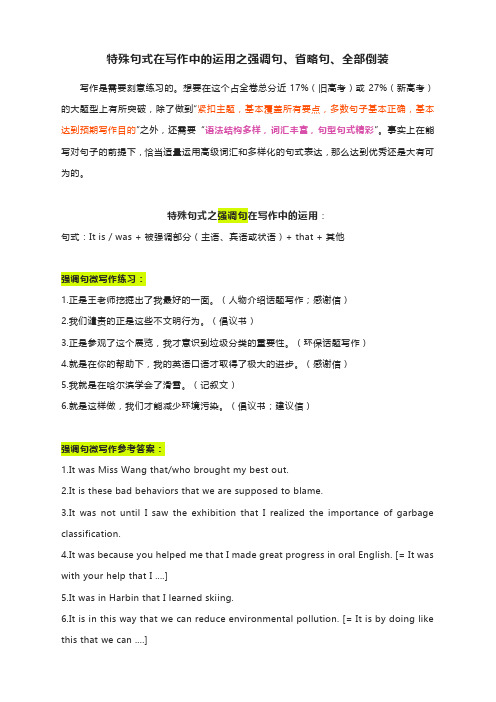
特殊句式在写作中的运用之强调句、省略句、全部倒装写作是需要刻意练习的。
想要在这个占全卷总分近17%(旧高考)或27%(新高考)的大题型上有所突破,除了做到“紧扣主题,基本覆盖所有要点,多数句子基本正确,基本达到预期写作目的”之外,还需要“语法结构多样,词汇丰富,句型句式精彩”。
事实上在能写对句子的前提下,恰当适量运用高级词汇和多样化的句式表达,那么达到优秀还是大有可为的。
特殊句式之强调句在写作中的运用:句式:It is / was + 被强调部分(主语、宾语或状语)+ that + 其他强调句微写作练习:1.正是王老师挖掘出了我最好的一面。
(人物介绍话题写作;感谢信)2.我们谴责的正是这些不文明行为。
(倡议书)3.正是参观了这个展览,我才意识到垃圾分类的重要性。
(环保话题写作)4.就是在你的帮助下,我的英语口语才取得了极大的进步。
(感谢信)5.我就是在哈尔滨学会了滑雪。
(记叙文)6.就是这样做,我们才能减少环境污染。
(倡议书;建议信)强调句微写作参考答案:1.It was Miss Wang that/who brought my best out.2.It is these bad behaviors that we are supposed to blame.3.It was not until I saw the exhibition that I realized the importance of garbage classification.4.It was because you helped me that I made great progress in oral English. [= It was with your help that I ....]5.It was in Harbin that I learned skiing.6.It is in this way that we can reduce environmental pollution. [= It is by doing like this that we can ....]省略句微写作练习:1.2022冬奥会如期在北京召开了。
简明语法系列---倒装 强调 替代 省略 高三英语二轮专题
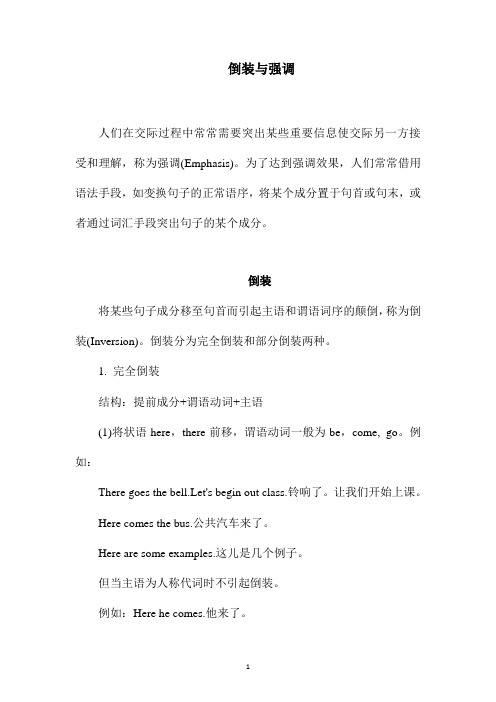
倒装与强调人们在交际过程中常常需要突出某些重要信息使交际另一方接受和理解,称为强调(Emphasis)。
为了达到强调效果,人们常常借用语法手段,如变换句子的正常语序,将某个成分置于句首或句末,或者通过词汇手段突出句子的某个成分。
倒装将某些句子成分移至句首而引起主语和谓语词序的颠倒,称为倒装(Inversion)。
倒装分为完全倒装和部分倒装两种。
1. 完全倒装结构:提前成分+谓语动词+主语(1)将状语here,there前移,谓语动词一般为be,come, go。
例如:There goes the bell.Let's begin out class.铃响了。
让我们开始上课。
Here comes the bus.公共汽车来了。
Here are some examples.这儿是几个例子。
但当主语为人称代词时不引起倒装。
例如:Here he comes.他来了。
Aren't you looking for your bag? Look, here it is.你不是在找包吗?瞧,在这儿。
(2)表示位置转移的副词如up, down,in, out, away, ahead移至句首。
例如:The driver couldn't control his car and down came the car.司机控制不了汽车,汽车向下滑。
Up went the rocket.火箭上升。
Lower flew the eagle till it caught the rabbit.鹰低飞直到抓住兔子。
但当主语为人称代词时不引起倒装。
例如:Away they went.他们走开了。
Higher and higher it flew.它越飞越高。
(3)句首状语为表示地点的介词词组In the centre of the square stands a high monument.广场中央矗立着很高的纪念碑。
倒装句的省略与强调

倒装句的省略与强调倒装句是英语中常见的语法结构之一,它在句子中的使用可以产生不同的语法效果,包括省略和强调。
本文将详细介绍倒装句的省略和强调两个方面,并通过例句进行解析。
一、倒装句的省略倒装句的省略是指在一般疑问句和以否定词开头的句子中,省略部分或全部主语或助动词的语法现象。
具体来说,省略的内容通常是根据上下文来推测的,尽管在语法上存在省略,但在交流中仍能准确理解句子的含义。
1. 一般疑问句的省略在一般疑问句中,人称代词主语和助动词都可以被省略。
例如:"Do you like ice cream?"(你喜欢冰淇淋吗?)"Like ice cream?"(喜欢冰淇淋吗?)在以上例句中,省略了主语"you"和助动词"do",但仍能准确地理解问句的意思。
2. 以否定词开头的句子的省略以否定词开头的句子中,主语和助动词也可以被省略。
例如:"Never have I been to Paris."(我从未去过巴黎。
)"Never been to Paris."(从未去过巴黎。
)以上例句中,省略了主语"I"和助动词"have",但仍能正确表达句子的否定含义。
二、倒装句的强调倒装句的强调是指通过倒装结构来强调句子中的某一部分,使其在句子中获得更高的显著性和重要性。
常见的强调结构包括将状语、谓语或宾语移至句首。
以下是几个常见的强调倒装句的例子:1. 将状语移至句首强调"In the park were hundreds of people enjoying the sunshine."(公园里有成百上千的人在享受阳光。
)句子中的状语"在公园里"被移至句首,强调了人们在公园里享受阳光这一行为。
2. 将谓语动词移至句首强调"Never before have I seen such a beautiful sunset."(我从未见过如此美丽的日落。
特殊句式(强调、省略、主谓一致、倒装及其他)高考英语 语法

find out ________ the rich merchant.
A.who it was that killed C.it was who killed 解析: B.who was it that killed D.who was it killed
考查强调句型。强调句型的疑问句结构为:疑问词+is it
Dr Smith 将在今年夏天和妻子女儿们一起游览北京。
In my opinion,he,rather than you,is to blame. 依我看来,他,而不是你该受谴责。
(2)由there,here引起的主语不止一个时,谓语通常和最邻近的主
语保持一致。
There is a pencil and two pens in the pencilbox. 文具盒内有一支铅笔和两支钢笔。 2.意义一致原则 (1)谓语动词为单数的情况
2.(2011· 潍坊质量监测)When people cut down big trees,new
trees should be planted.________they will have no trees to cut down in the
future. A.If not C.If no so 解析: B.If so D.If don’t
语动词应该与or后面的名词保持一致,使用单数;根据语意可知,应该
使用被动语态。
答案: A
2.(2010· 海淀第二学期期末)—Have you heard that Jones,along
+that...而这里是强调句的疑问句结构作宾语,故用正常的陈述语序,
所以答案为A。
答案: A
1.在when,while,whenever,till,as soon as,if,unless,as if,
高考英语短文改错特殊句式强调句倒装省略therebe结构祈使句感叹句
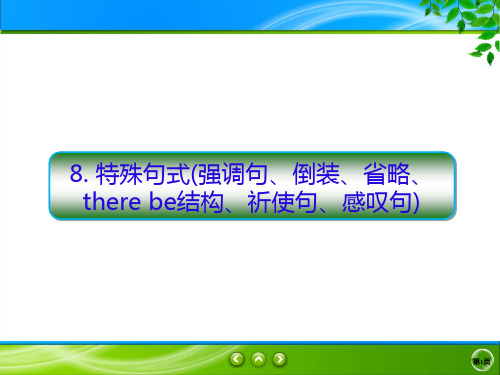
程中对此要特别关注。有关倒装句的分类和情况见下图:
全部倒装
表示方位或时间的副词或介词短语,如 here, there, then, in, up, down, off, away, in the room, on the wall 等置于句首,谓语动词多为 be, come, go 等,并且主语是名词时(主语为代词时,不能倒装)
第5页
【典例 5】 (2019·广东茂名五大联盟联考)A large number of people are on the phone or online while ________ (watch) television.
答案:watching。句意:许多人一边看电视一边打电话或上网。 while 引导的状语从句省略了主语 people 和 are,且“people”与“watch” 之 间 为 主 谓 关 系 , 还 原 后 为 while people are watching, 故 填 watching。
将 if 省略,则要将 had, were 或 should 提到主语之前
第18页
①Into the complete silence of the waiting class came the teacher's sweet voice, “Good morning, children.”
②Not until he went through real hardship did he realize the love we have for our families is important.
第9页
【典例 9】 (2019·福建四校联考)________ exciting news it was that our class won the first prize in the English contest!We lived up to our teacher's expectations in the end.
高考英语:写作中的高级表达+妙记9+彰显水平的特殊句式(强调、倒装和省略)
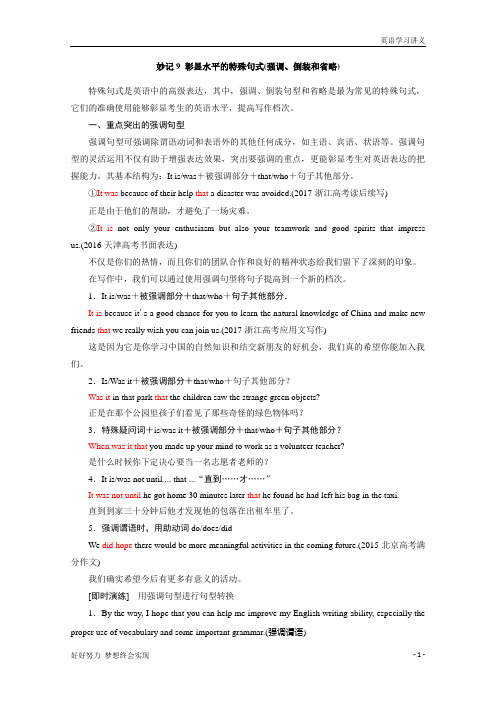
妙记9 彰显水平的特殊句式(强调、倒装和省略)特殊句式是英语中的高级表达,其中,强调、倒装句型和省略是最为常见的特殊句式,它们的准确使用能够彰显考生的英语水平,提高写作档次。
一、重点突出的强调句型强调句型可强调除谓语动词和表语外的其他任何成分,如主语、宾语、状语等。
强调句型的灵活运用不仅有助于增强表达效果,突出要强调的重点,更能彰显考生对英语表达的把握能力。
其基本结构为:It is/was+被强调部分+that/who+句子其他部分。
①It was because of their help that a disaster was avoided.(2017·浙江高考读后续写)正是由于他们的帮助,才避免了一场灾难。
②It is not only your enthusiasm but also your teamwork and good spirits that impress us.(2016·天津高考书面表达)不仅是你们的热情,而且你们的团队合作和良好的精神状态给我们留下了深刻的印象。
在写作中,我们可以通过使用强调句型将句子提高到一个新的档次。
1.It is/was+被强调部分+that/who+句子其他部分.It is because it's a good chance for you to learn the natural knowledge of China and make new friends that we really wish you can join us.(2017·浙江高考应用文写作)这是因为它是你学习中国的自然知识和结交新朋友的好机会,我们真的希望你能加入我们。
2.Is/Was it+被强调部分+that/who+句子其他部分?Was it in that park that the children saw the strange green objects?正是在那个公园里孩子们看见了那些奇怪的绿色物体吗?3.特殊疑问词+is/was it+被强调部分+that/who+句子其他部分?When was it that you made up your mind to work as a volunteer teacher?是什么时候你下定决心要当一名志愿者老师的?4.It is/was not until ... that ...“直到……才……”It was not until he got home 30 minutes later that he found he had left his bag in the taxi.直到到家三十分钟后他才发现他的包落在出租车里了。
特殊句式(强调、倒装、省略及其他)

解析:考查完全倒装。副词there,here等位于句首,应用 完全倒装句式。句意:约翰打开门,他从来没见过的一位 女孩站在那儿。
答案: D
2.(2010· 江西高考)Not until he left his home ________ to
know how important the family was for him.
The computer was used in teaching.As a result,not
only was teachers' energy saved,but students became more interested in the lessons.(2009· 全国卷Ⅰ)
电脑被应用于教学中,结果,不仅节省了老师的精力,
你是昨天在大街上碰到你老师的吗?
Who was it that told you such a thing? 究竟是谁告诉你这么件事的? Why was it that you didn't come to the meeting yesterday? 究竟是为什么你昨天没有来开会?
I just wonder what it is that makes him so excited.(山东高考)
(5)表语、状语或动词原形+as/though+主语+其他 时,句子要倒装 Much as I like it,I'll not buy it. 尽管我很喜欢它,但我不会买。
Pretty as she is,she is not proud.
尽管她很漂亮,但她一点也不自负。 Try as he would,he might fail again. 尽管他还会试,但可能还会失败。
高中英语语法特殊句式(倒装、省略、强调)
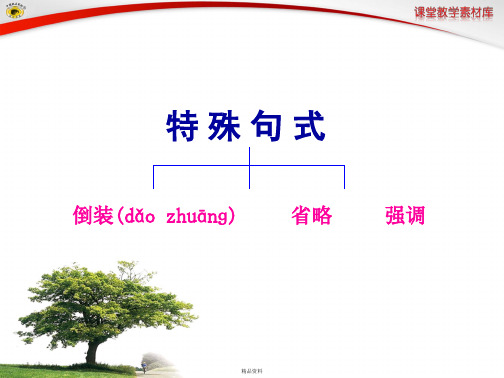
3.在对话或并列句中,如果主语(zhǔyǔ)、谓语不同,而宾语相同, 则常省去相同的宾语部分。 Tom enjoys dancing, but Peter hates (dancing).
精品资料
4.省略作宾语的不定式短语,只保留to,但如果该宾语是动词 be或完成时态,则须在之后加上be或have: —Are you going there? —Yes, I’d like to (go there). 注意(zhù yì):在下列词后常省略不定式但要保留to: want, wish, like, hate, hope, intend, plan, love, refuse, expect,但当 want 和like用于从句中时,to常常省略。
My office was on the tenth floor, and his (office was) on the twelfth (floor). 并列句的省略有时还可出现在前面(qián mian)的分句 中,这时被省略的词语便出现在下文。
精品资料
5.only + 状语(zhuàngyǔ)(副词、介词短语、状语(zhuàngyǔ)从句)放在句首时 。(部分倒装) 1)Only then did I realize the value of reading aloud every morning. 2)Only by means of talking can we avoid misunderstanding each other.
精品资料
2.方位词in, out, there, here, inside, outside, up, down, away, off, downstairs, upstairs等以及now, then置于句首时,谓语动词常用 be, come, go, lie, run等,并且句子的主语(zhǔyǔ)是名词。为以示 强调或为了使情景更生动, 要全部倒装。(全部倒装) 1) Away flew the bird which I bought yesterday. 2) Now comes your turn to sweep the floor. 注意: 主语(zhǔyǔ)是人称代词时,仍用自然语序。 Away they went. (=They went away.)
- 1、下载文档前请自行甄别文档内容的完整性,平台不提供额外的编辑、内容补充、找答案等附加服务。
- 2、"仅部分预览"的文档,不可在线预览部分如存在完整性等问题,可反馈申请退款(可完整预览的文档不适用该条件!)。
- 3、如文档侵犯您的权益,请联系客服反馈,我们会尽快为您处理(人工客服工作时间:9:00-18:30)。
1) 当从句的主语和主句的宾语一致时,间或也有这样的省略,如:
Her father told her to be careful when (she was)crossing the street.当她过马路时父亲告诉她要当心。
2) 当从句的主语是 it,谓语动词中又含有系动词be 时,可以把it和系动词be一起省略。此时构成连词(if , unless ,when , whenever)+形容词的结构。如:
解析:在正式文体中,有时可把虚拟条件句中的连词省去,而将助动词提到主语前面。A项符合上述规则和句意。虚拟条件句倒装只需将助动词提到主语前,不提前行为动词及其修饰成分,故B项错误。C和D都是对现在情况的假设,而骨折已是事实,故不符合题意排除。故答案为A
______I’ll marry him all the same. (04年真题第52题)
解析:Little为否定词,置于句首句子需用部分倒装,所以仅将助动词提前即可。排除A和B,C虽然是部分倒装,但情态动词may用在句中语气错误,排除。故该题答案为D
2. 用于以only所修饰的副词、介词短语或状语从句的句子中。
Eg: ______both sides accept the agreement ______ a lasting peace be established in this region.(04年真题第60题)
5. 直接引语的全部或一部分放在句首时,主句中的主谓也常直接倒装。
e.g. "Very well," said the French student.
二.省略
在英语语言中,为了使语言简洁明了,重点突出或上下文紧密相连,可以省去某些句子成分而保持句子原意不变,这种语言现象称之为省略。
倒装、强调、省略
一. 倒装
部分倒装
定义:部分倒装是指将谓语的一部分如助动词或情态倒装至主语之前。如果句中的谓语没有助动词或情态动词,则需添加助动词do, does或did,并将其置于主语之前。
引起部分倒装的情况:
1. 在以never, little, hardly, not only, few, not, seldom, in no way, no sooner...than等否定副词开头的句子中,采用部分倒装。
(02年真题第78题)
A. Although B. Since C. Despite D. Because
解析:此句为although引导的让步状语从句。另外,本句中状语从句和主语从句的主语相同,因而省略了从句中的主语和be动词。故答案为A
5.在虚拟语气条件句中从句谓语动词有were, had, should等词,可将if省略,把were, had, should移到主语之前,采取部分倒装。
如:There goes the bell.
2. 为了表达生动,有时把表地点、方位的副词,如 up, down, out, away, in等放在句首,同时把谓语动词放在主语之前。若主语为人称代词,主语和谓语动词的位置不变,只将副词放在句首。
e.g. Away hurried the boy.
并列复合句中的省略
在并列句中后边的分句可以省略与前边分句中相同的成分。
如:a) The boy picked up a coin in the road and (the boy ) handed it to a policeman.
b) Your advice made me happy but(your advice made) Tom angry .
Unless (it is) necessary ,you'd better not refer to the dictionary.
2.定语从句中的省略
1) 一般说来,在限制性定语从句中,作宾语的关系代词 that ,which , whom 可以省略;
A. who B. as C. that D. like
解析:as引出让步状语从句时,要求句子部分倒装。故答案为B
______native to America, the plant now can be seen all around the world.
(4) 连词(when , while , though )+ 现在分词;
(5) 连词(when ,if ,even if ,unless ,once ,until, than , as ) + 过去分词;
(6) 连词(as if ,as though ) + 不定式。
如:a) Once (he was)a worker ,Pang Long now becomes a famous singer .
6. 在某些表示祝愿的句型中
如:May you all be happy.
完全倒装
定义:全部倒装是只将句子中的谓语动词全部置于主语之前。此结构通常只用与一般现在时和一般过去时。
引起完全倒装的情况:
1. here there, now, then, thus等副词置于句首,谓语动词常用be, come, go, lie, run。
A. Was he rich or poor B. Whether rich or poor
C. Were he rich or poor D. Be he rich or poor
解析:此句为对将来事实的虚拟且省略了连词,应用部分倒装。故答案为D,相当于whether he is rich or poor.
Out rushed the girl.
注意上述全部倒装的句型结构的主语必须是名词,如果主语是人称代词则不能完全倒装。
如:Here he comes.
3. so…that句型中的so位于句首时,需倒装。
如:So frightened was he that he did not dare to move an inch.
Eg: little _____about her own safety, though she herself was in great danger. (09年真题第59题)
A. she cared B. she may care C. may she care D. did she care
A. So is it. B. So it is. C. So it does. D. So does it.
解析:答案为B“so+主语+be动词/助词/情态动词”用来表示赞成前一说话者所说的内容,可译为“是的”、“的确如此”。本句就是这一用法。选项A是so的另一用法,即“so + be动词/助动词/情态动词+主语”这一结构用来表示前面所述的情况也适用于另一个人,意为“……也一样”。
注意:如果only后的词组不是状语,不需倒装。
Eg: Only Wang Lili knows this.
3. So + 形容词、副词及such 置于句首时要倒装。
Eg: So happy did he feel.
Such was me.
1) 当状语从句的主语与主句的主语一致时,可以省略状语从句的主语和系动词be,这时从句中可出现如下结构:
(1) 连词(as, as if , once)+ 名词;
(2) 连词( though, whether , when)+形容词;
(3) 连词(whether, as if ,while )+介词短语;
A. Only if, will B. If only, would C. Should, will D. Unless, would
解析:only if意为“只有...才”,放在句首时句子要倒装;if only意为“只要,要是...多好”。该句意思是:只有双方都接纳合约,永久的和平才有可能建立起来。故根据句意可知答案为A
4. as ,although引导让步状语从句时要倒装(形容词/ 副词/ 名词/ 动词 + as + 主语 + 谓语)。
Eg: Fool ____ Jane is, she could out of her wages to help her mother. (02年真题第58题)
b) Work hard when (you are) young, or you'll regret.
c) He looked everywhere as if (he was)in search of something . d) While (he was) holding talks with President Hu Jintao ,US President George W. Bush thanked China for its important role in the Six-Party Talks.
2)由whether ,if , , although ,even if ,whatever等引导的让步状语从句;
4)由 as ,than 等引导的比较状语从句
5)由as, as if , as though 等引导的方式状语从句。上述状语从句在省略时应遵循下面原则:
Eg: _____for the fact that she broke her leg, she might have passed the exam. (02年真题第60题)
A. Had it not been B. Hadn’t it been C. Was it not D. Were it not
4.重复倒装句型
用在以so, nor, neither开头,表示谓语所述的情况也适用于另一个人或一事物的肯定或否定句中。so用于肯定句,表示“也一样”“也这样”;nor, neither用于否定句,表示“同样也不,也不这样”。
